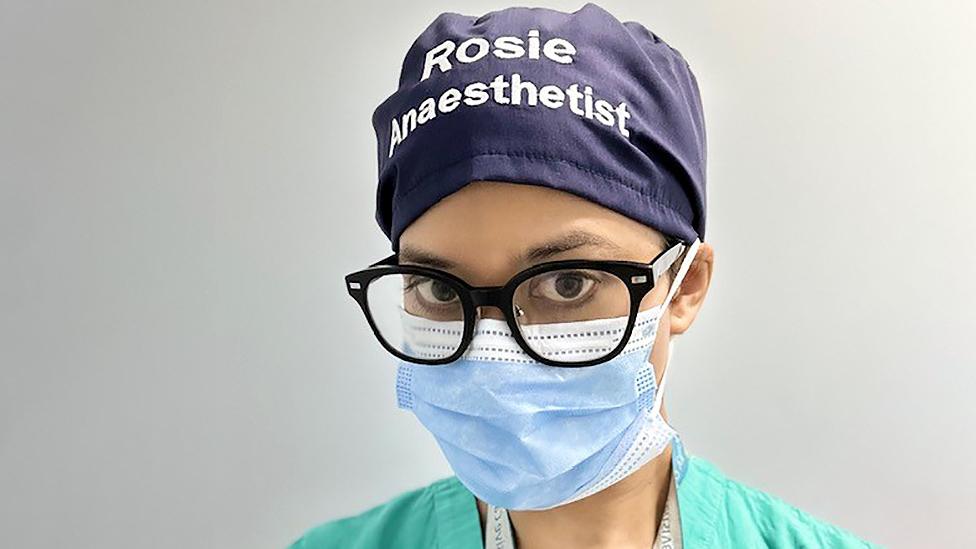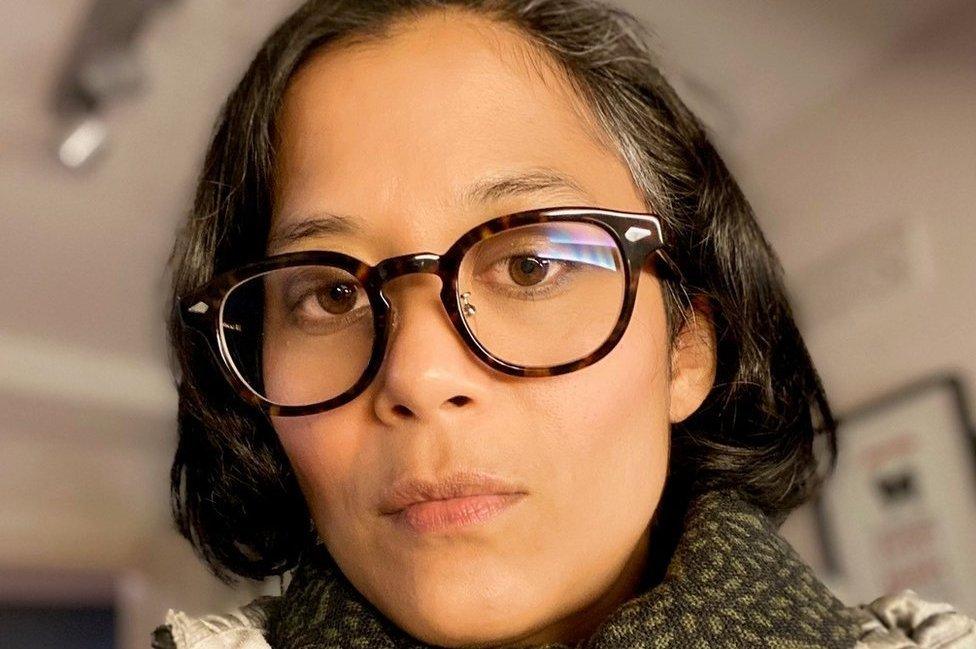The NHS consultant who was diagnosed with autism at 46
- Published

Dr Rosie Baruah is based at the Western General Hospital in Edinburgh
An autistic ICU consultant believes stigma and fear of discrimination is delaying some health professionals from seeking help and diagnosis.
Dr Rosie Baruah, who works for NHS Lothian, was diagnosed in December at the age of 46.
Earlier this year she took to social media in a bid to raise awareness of neurodiversity.
Dr Baruah believes better education and support should be made available to help autistic people in the workplace.
The consultant was diagnosed at the same time as her 16-year-old daughter and said the news allowed her to make sense of her life.
But she understands why others in her profession may be less willing to share their experiences.
Dr Baruah told BBC Radio Scotland's Drivetime: "Since I was open about my diagnosis of autism on Twitter I have had messages from people who either strongly suspect they are autistic or have been diagnosed formally as autistic but they do not feel safe to be open about it because they fear discrimination.
"They fear that people will not think they are safe to be a clinician."
Dr Baruah, who is based at Edinburgh's Western General Infirmary, said said it was a "great shame" that some people did not feel confident about sharing their own diagnosis.
She added: "I think there is still a huge amount of fear and stigma, particularly people who are early in their careers and are depending on approval of people who are more established to progress.
"The more 'normal' you make yourself look the less likely you are to risk being discriminated against by people who simply don't understand what being autistic is like and how it can affect you.
"It still means you can be a completely safe doctor."

Dr Baruah was diagnosed with autism last December
Dr Baruah also called for more investment and a sharper focus on raising awareness.
She explained: "Until fairly recently I had a narrow stereotypical view of what autistic people were like.
"I also had the very great privilege that my daughter and I could pursue a private diagnosis because the waiting times for diagnosis on the NHS are, as you can imagine, horrifically long.
"I think there is a huge amount that could be done in terms of both funding as well as education to allow destigmatising of conditions and neurotypes, like autism, that I think really hold people back from being able to live their lives."
Autism is not defined as an illness or a disease, according to the NHS. Instead, an autistic person's brain works differently than other people.
And it's a spectrum, meaning every autistic person is different. Some common characteristics might include finding it hard to communicate and interact with others, getting anxious about unfamiliar situations or doing the same thing repeatedly.
'That's how I have always felt'
Dr Baruah suspected she may be autistic after reading an interview in The Times, external with author Holly Smale, who was diagnosed at the age of 39.
The creator of the bestselling series of children's books, Geek Girl, later spoke about her experiences for BBC Radio Four's Room 5.
Describing her lightbulb moment, Dr Baruah recalled the author's description of social interactions always requiring a "degree of rehearsal".
She said: "I just thought 'Oh my goodness. That's how I have always felt.'"
The consultant began to reassess her own life, from her birth in the west of Ireland to an upbringing that took in London, Kirkcaldy, Fort William, Glasgow and Edinburgh.
Women and girls might be overlooked from getting an autism diagnosis because of the historical perception that autism mostly affects men and boys, or because they're adept at "masking" or camouflaging their autistic traits.
'Every lunchtime I would go home'
Dr Baruah recalled that at primary school she could be abrupt, "truthful when it was not appropriate to be truthful" and not very good at imaginative play.
She also said she struggled with forming female friendships.
By the time she reached secondary school the environment was "so much busier and noisier".
Dr Baruah admitted she only had "one or two close friends" built on a shared obsession with the cult US TV drama Twin Peaks.
She said: "Every lunchtime I would go home because I couldn't cope with the entire day at school.
"I retrospect so much of my behaviour was, absolutely, a function of the fact that I am autistic."
Her research also helped explain other aspects of her life.
Dr Baruah added: "The thing that really got me was realising that autism isn't a spectrum in the way that people think its a linear spectrum, from very mild to very severe, its a spectrum more in terms of the different components of it."
The anaesthetist said in her case her communication challenges were very mild but she found social interactions "really challenging".
She said: "Now for instance, at the end of a working day, I am in bed by half eight with the lights down really low and no noise.
"I need that time to decompress after a day of interacting because its incredibly demanding."
Dr Baruah also revealed she didn't realise when she studied medicine at the University of Edinburgh how well suited she was to her chosen career.
'A lot of it was a relief'
She said: "Autistic people generally thrive on routine and intensive care medicine generally involves a lot of routine."
For example, we spend a lot of time paying very close attention to detail such as going through checklists with patients.
She explained professional conversations also follow a similar pattern.
Dr Baruah added: "That's what I have been doing most of my life - rehearsing conversations in advance and using social scripts so from that point of view it really suits autistic people."
But conversely she admitted some aspects of the job, including the noise, smells and dealing with unfamiliar people could be "overwhelming".
In the four months since her diagnosis Dr Baruah has drawn comfort from reinterpreting her life through a different lens and the recognition that her brain works in a different way.
She admitted: "A lot of it was a relief.
"It allows a reinterpretation of the past that is more accurate and makes you feel less broken."
Information and support about autism can be found via the BBC Action Line.